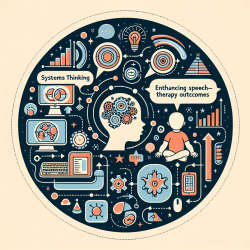Introduction
As practitioners in the field of speech-language pathology, we are constantly seeking ways to improve our methods and outcomes for the children we serve. A recent study titled "Advancing the application of systems thinking in health: understanding the growing complexity governing immunization services in Kerala, India" provides valuable insights that can be adapted to our practice. This blog explores how we can implement systems thinking to enhance our therapy services and encourages further research in this area.
Understanding Systems Thinking
Systems thinking is an approach that views complex systems as a whole rather than in isolated parts. It emphasizes the interactions and feedback loops among various components within a system. The study on immunization services in Kerala used systems thinking to uncover the underlying factors affecting vaccination coverage. Similarly, we can apply this approach to understand the complexities in speech-language therapy and improve our service delivery.
Key Findings from the Study
The study identified several phenomena inherent to complex adaptive systems (CAS) such as phase transitions, feedback loops, path dependence, and self-organization. These phenomena influenced the changes in vaccination coverage in Kerala. By developing causal loop diagrams, the researchers depicted the interactions among actors and critical events that influenced these changes.
Applying Systems Thinking in Speech-Language Pathology
Here are some ways we can apply the findings from the study to our practice:
- Phase Transitions: Just as the initial acceptability of vaccination in Kerala was replaced by resistance, we can observe similar transitions in therapy acceptance. Understanding these transitions can help us develop strategies to maintain or regain trust and engagement in therapy.
- Feedback Loops: Positive and negative feedback loops play a crucial role in therapy outcomes. For instance, positive reinforcement from parents and teachers can enhance a child's progress, while negative feedback or lack of support can hinder it. Identifying and managing these loops can lead to better outcomes.
- Path Dependence: The choices made at various stages of therapy can lead to different outcomes. By understanding the path dependence, we can make informed decisions that steer the therapy in a positive direction.
- Self-Organization: Encouraging self-organization within therapy sessions can lead to emergent behaviors that contribute to the child's development. Allowing children to take the lead in certain activities can foster independence and confidence.
Encouraging Further Research
The study underscores the importance of understanding the dynamics of complex systems. As practitioners, we should not only implement these insights but also contribute to the growing body of research. Conducting studies that explore the application of systems thinking in speech-language therapy can provide valuable data and lead to innovative approaches.
Conclusion
Applying systems thinking to speech-language pathology can significantly enhance our understanding and management of therapy processes. By focusing on the interactions and feedback loops within the system, we can develop more effective strategies to improve outcomes for children. I encourage all practitioners to explore this approach and contribute to further research in this area.
To read the original research paper, please follow this link: Advancing the application of systems thinking in health: understanding the growing complexity governing immunization services in Kerala, India.










